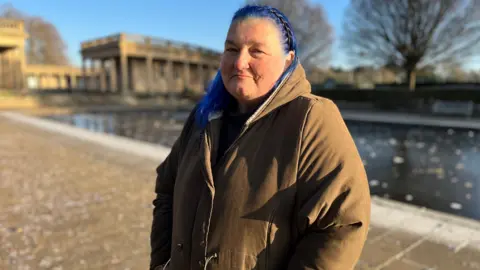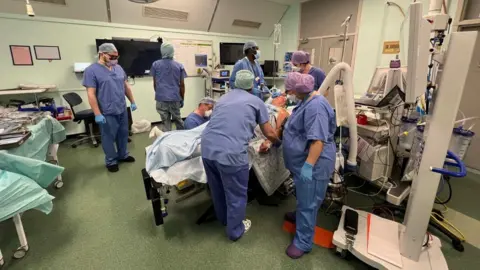Norwich grandmother shares her experience after weight loss op
 Shaun Whitmore/BBC
Shaun Whitmore/BBCWhen Penny Browne underwent a gastric bypass operation after having no success with dieting and slimming groups, she hoped to get her "life back". How is she doing seven months on and what is she looking forward to in 2023?
"I feel so much happier," says Miss Browne.
The 54-year-old grandmother-of-four from Norwich is now 18st and 7lb (117kg), five stone lighter than before her operation.
"I feel so much better for it; I don't feel so tired all the time now, I feel like my health is improving and I can breathe better," she says.
Before she had the operation at Luton and Dunstable Hospital in May, she said she was worried she would not live to see her children grow up, let alone her grandchildren.
Her weight gain was also accompanied by the onset of asthma, high blood pressure and the need to wear a sleep apnoea mask at night.
Her partner of 23 years, Ian Gooch Woodhouse, was also worried about her health, as were her three children.
But since shedding the pounds, she says she is much more active and is feeling the benefits.
"I walk a lot further. I live up near the university and I can walk all the way into the city now without too much effort," she says.
"I spoke to my sleep specialist and he's hoping in the next six or seven months, I can hopefully stop using my sleep apnoea machine as well, as my weight keeps dropping."
 Steve Hubbard/BBC
Steve Hubbard/BBCMiss Browne resorted to the "drastic option" of weight loss surgery after "trying everything under the sun" and having no success with dieting, calorie-counting, slimming groups, fasting or a plethora of juices and shakes.
At the time, she said it was "heart-breaking not being able to get the weight off".
After waiting for almost two years for the operation, she says she would "recommend it to anybody" if they think it is the step they need to take.
"I'm so pleased I've had it done," she says. "It's certainly helped me, I don't think I would be where I am now without it."
It is estimated that about 8,000 people across the UK have undergone weight loss surgery this year as the nation tackles an obesity crisis in the wake of the pandemic.
People are eligible for weight loss surgery if they have a body mass index (BMI) of above 40, which would roughly be above 15st (95kg) for a woman and 16st (102kg) for a man, said Luton and Dunstable Hospital.
They also have to have other medical conditions including type 2 diabetes, disruptive sleep apnoea, joints and/or back pain, and must go through a non-surgical weight loss programme first.
Miss Browne, who has regular check-ups with the hospital, still takes medication for her high blood pressure and to reduce her risk of stroke, but as her weight drops and health improves, she hopes to be taking fewer tablets.
"If I can get off some of the things that were purely weight-related, I'll be happy," she adds.
'Much more hopeful'
The weight loss has also helped her enjoy new experiences.
Earlier this year she says she was able to see "so many things" while on holiday abroad with her partner.
"I just kept walking," she says. "I would've normally said 'you keep going and I'll wait here for you to come back and you can tell me about the things'.
"But this time, I got to see chipmunks and all these other things I would never have done."
As a new year is about to begin, Miss Browne says she feels "so much more hopeful" about the future.
She says she is hoping to still lose more weight and is also getting on her exercise bike daily, doing strength exercises and walking around the local parks.
"Now I've started I don't want to stop and let it go backwards," she says.

Find BBC News: East of England on Facebook, Instagram and Twitter. If you have a story suggestion email [email protected]
